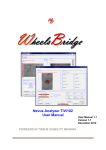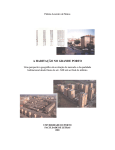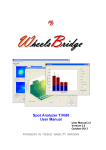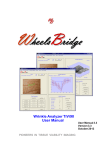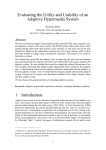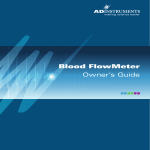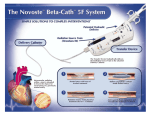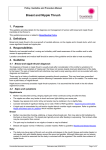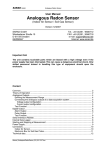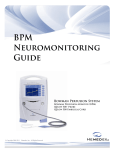Download Skin Damage Visualizer TiVi60 User Manual
Transcript
Skin Damage Visualizer TiVi60 User Manual User Manual 3.2 Version 3.2 October 2013 PIONEERS IN TISSUE VIABILITY IMAGING TiVi60 Skin Damage Visualizer Dear Valued Customer! Welcome to the WheelsBridge Skin Damage Visualizer TiVi60 system designed for automatic analysis of the extent of areas plagued with erythema (vasodilatation) and blanching (vasoconstriction) frequently accompanying contact dermatitis and vasospasm caused by use of vibrating tools. The Skin Damage Visualizer was designed especially for observer-independent automatic analysis of the microcirculation of the hands and is, due to its portability, well suited for measurements at the work-site. The Skin Damage Visualizer utilizes a highly sensitive digital camera equipped with polarization filters making it possible to “see through” the top layer of the skin and probe the microcirculation of the dermal structures. The versatile system software – based on the MATLAB® high performance language for technical computing – allows for rapid and easy capturing and analysis of tissue viability images. Among the many useful features of the Skin Damage Visualizer software the following are particularly helpful in the evaluation of microvascular disturbances in the hands due to occupational hazards: ? Automatic capturing of a sequence of photos. ? Easy identification of skin areas plagued with erythema and blanching by use of superimposed color schemes. ? Zoom-in features to display details of images. ? Marking of a normal skin reference area as a basis for visualization of erythema and blanching. ? Uploading of up to eight images to display consecutive changes in skin microvasculature. ? Integrated trend analysis. ? Export of data to Excel® spreadsheet. ? Online manual We are convinced that the Skin Damage Visualizer will be a helpful tool in the assessment and follow-up of microvascular disturbances of the hands in a variety of conditions related to occupation medicine. Thank you for choosing the WheelsBridge Skin Damage Visualizer TiVi60. WheelsBridge AB Skin Damage Visualizer TiVi60 3.2 Sida 1 TiVi60 Skin Damage Visualizer Information in this document is subject to change without notice and does not represent a commitment on the part of WheelsBridge AB. No part of this manual may be reproduced or transmitted in any form or by any means, electronically or mechanically, including photocopying and recording, for any purpose without the express written permission of WheelsBridge AB. Any use of applicatio n of WheelsBridge products must be performed by properly trained and qualified personnel. WheelsBridge AB takes no responsibility for action taken on the basis of information derived from the use of the product described in this manual or from consequential damages in connection with furnishing, performance or use of this manual. Licensee’s limited rights are governed by the license agreement between WheelsBridge AB and MathWorks. Licensee may not modify or remove any license agreement file (MarthWorks or third party) that is included with the MCR Libraries (“MCR Library License”). Licensee of this Application accepts the terms of the MCR Library License. The Skin Damage Visualizer is patented and/or patents are pending in several countries. WheelsBridge is a registered trade mark. Skin Damage Visualizer TiVi60 3.2 Sida 2 TiVi60 Skin Damage Visualizer 1. INTRODUCTION The Skin Damage Visualizer TiVi60 is a polarization spectroscopy camera software package intended for visualization and assessment of the extension of skin areas plagued with erythema (vasodilatation) or blanching (vasoconstriction) in the microcirculation. The system is particularly designed for investigation of inflammatory processes in the hands in association with contact dermatitis and for investigation of vasospasm caused by e.g. vibrating tools. The system automatically delivers quantitative data of these parameters, thereby making possible observer-independent assessment of the progress of a disease process over time or comparison of test results obtained at different work sites. Typically, images of a hand recorded at different points in time are displayed and compared with respect to the relative extension of the areas affected by erythema and/or blanching. Alternatively a comparison of the skin microvascular status in the left and right hand can be made. An integrated library function allows for comparison of up to eight images simultaneously. Based on the information of these images, the trend of the erythema/blanching process is determined. The intended use of the Skin Damage Visualizer TiVi60 is to investigate the extent of skin damage in occupational health research applications. It is not yet approved for the diagnosis and treatment of disease. 2. THE SKIN DAMAGE VISUALIZER TiVi60 The Skin Damage Visualizer comprises a camera mounted to a flexible table mounted stand during image capturing, a portable computer and a software package for image processing and data presentation. All interaction with the Skin Damage Visualizer is made through the computer keyboard. The system is truly portable and can easily be moved from one workplace to another, thereby facilitating investigations at the work-site. Skin Damage Visualizer TiVi60 3.2 Sida 3 TiVi60 Skin Damage Visualizer 3. OPERATING PRINCIPLES flash detector filter polarized light skin depolarized light Linearly polarized white light is partly reflected by the upper layer of the skin and partly diffusely scattered in the deeper dermal layers where the microvascular network is located. Most of the directly reflected light preserves its state of linear polarization, while the light diffusely scattered in the tissue successively becomes randomly polarized. The backscattered linearly polarized light directed towards the detector is effectively blocked by a filter with a polarization direction perpendicular to that of the linearly polarized light. A portion of the randomly polarized light passes through this filter and reaches the detector. This arrangement gives the impression that the camera can see through the top layer of the skin and probe the microcirculation in the deeper dermal layers. The green component of the light reaching the detector is attenuated due to a high absorption in red blood cells while the red component is virtually unaltered because of its low absorption in the red blood cells. Surrounding tissue absorbs green and red polarizartion photo light to approximately the same amount. The Skin Damage Visualizer takes advantage of this wavelength dependence in red blood cell absorption. By first separating red plane green plane the colour matrixes and then applying an algorithm in which the value of each picture algorithm element in the green colour matrix is subtracted from the corresponding value in the red colour matrix, an output matrix representing the local red blood cell concentration is generated. By applying a threshold based on e.g. a region of interest including healthy skin, the extension and location of areas with values above or below this threshold can be displayed superimposed on the photo. Skin Damage Visualizer TiVi60 3.2 Sida 4 TiVi60 Skin Damage Visualizer 4. HOW TO USE THE SKIN DAMAGE VISUALIZER TiVi60 4.1 Capturing new photos New photos are captured and stored through the TiVi701Camera window. Please refer to the TiVi701Camera Manual for further details of the photo capturing process. 4.2 Analyzing the images The following section uses the test images named erythema-0001 to erythema-0007 representing a slight skin irritation on the back of the hand. These images are stored in the TiVi60demonstration folder. 1. Start the Skin Damage Visualizer from inside the TiVi700 Analyzer. Click the First button. The Pick a File window will now open. Navigate to the TiVi60demonstration folder and double-click the image file named erythema0001. The Skin Damage Visualizer window should now look like: Skin Damage Visualizer TiVi60 3.2 Sida 5 TiVi60 Skin Damage Visualizer 2. Click the Second button and load the file named erythema-0006 stored in the TiVi60demonstration folder. The Skin Damage Visualizer window should now look like: 3. The First Image represents a situation with minor degree of erythema at the back of the hand. The Second Image represents the same hand now with more pronounced – but hardly visible - erythema. The difference is, however, difficult to determine, and in particular to quantify, by the naked eye. 4. To visualize and determine the relative extension of the areas plagued with erythema, drag the Threshold slider to the left and/or right and note how the extent of the red areas change. All areas in the images of the hands with a concentration of red blood cells above the actual threshold level are now colored red. Eventually set the Threshold by printing 0.3 in the Threshold edit textbox and click Enter on the computer key-board. The Skin Damage Visualizer window should now look like: Skin Damage Visualizer TiVi60 3.2 Sida 6 TiVi60 Skin Damage Visualizer 5. The increased extension of the erythema area from the First to the Second Image is now visualized. In the Results panel, the percentage area of the image of the respective hand colored red is displayed as well as the difference in percentage between the First and the Second Image. 6. Click Full View to display only the First Image. Skin Damage Visualizer TiVi60 3.2 Sida 7 TiVi60 Skin Damage Visualizer 7. Click the Second Image button the display the Second Image in Full View. 8. Click the Main Page to get back to the Skin Damage Visualizer main page. 9. Click the Photo radio-button in the Display panel to view the images only. 10. Mark a region of interest (ROI) in the First Image by use of the mouse (point to the upper left corner of where the ROI should start, hold the left mouse button down and drag the pointer to the lower right corner of the ROI and release the left mouse button). Click the Erythe ma radio button. The Skin Damage Visualizer TiVi60 window should now look like: Skin Damage Visualizer TiVi60 3.2 Sida 8 TiVi60 Skin Damage Visualizer 11. Click the Zoom In 1 button. The Skin Damage Visualizer TiVi60 window should now look like: Skin Damage Visualizer TiVi60 3.2 Sida 9 TiVi60 Skin Damage Visualizer 12. Click the Save 1 button to store the zoomed in image. In the Save As window, select a folder and give the zoomed image a name. Click Save to store the image. 13. Click Full View to display the zoomed in image in full view. Click the Main Page button to get back to the Skin Damage Visualizer TiVi60 main page. 14. Click the Zoom Out1 button to get back to the original view. 15. Click Reset ROI 1 to reset the region of interest marking. 16. Click Clear All to clear the Skin Damage Visualizer TiVi60 window from images. 4.2 Working with the Library 1. Click the Library button to get to the Library page. The Skin Damage Visualizer TiVi60 window should now look like: Skin Damage Visualizer TiVi60 3.2 Sida 10 TiVi60 Skin Damage Visualizer 2. Click the Load Photos button to upload images from the library. Navigate to the TiVi60demonstration folder and double click the erythema-0001 file. All the remaining images named erythema will now be uploaded (maximum eight images). The Skin Damage Visualizer TiVi60 window should now look like: Skin Damage Visualizer TiVi60 3.2 Sida 11 TiVi60 Skin Damage Visualizer 3. Print 0.3 in the Threshold edit textbox and click Enter on the computer keyboard. After a while the Skin Damage Visualizer TiVi60 window should look like: Skin Damage Visualizer TiVi60 3.2 Sida 12 TiVi60 Skin Damage Visualizer 4. This sequence of images demonstrates how the red areas (corresponding to erythema) successively increase in relative size. Click the Trend button to display the percentage red area for each of the images in the sequence. The Skin Damage Visualizer TiVi60 window should now look like: Skin Damage Visualizer TiVi60 3.2 Sida 13 TiVi60 Skin Damage Visualizer 5. The height of the different bars represents the relative skin area with skin irritation (erythema) in each of the images in the sequence. The y-axes automatically adapts to the highest value. To display the bars in a 100% full scale mode, click the 100% Max button. The Skin Damage Visualizer TiVi60 window should now look like: Skin Damage Visualizer TiVi60 3.2 Sida 14 TiVi60 Skin Damage Visualizer 6. Click the Clear All button to erase the images and bring the system back to the Main page. 4.3 Using a Reference Area In many applications the user would like to refer the degree of erythema or blanching to a reference area comprising normal skin circulation. By using the features in this section, the threshold is set in terms of percentage of reference area (to display erythema as values above the threshold value or to display blanching as values below the threshold value). 1. Begin with uploading the whitehand-0001 image as the First Image and the whitehand-0002 image as the Second Image. The Skin Damage Visualizer TiVi60 window should now look like: Skin Damage Visualizer TiVi60 3.2 Sida 15 TiVi60 Skin Damage Visualizer 2. Mark a region of interest (ROI) in the First Image that can be considered to represent normal skin microcirculation. The Skin Damage Visualizer TiVi60 window could now look like: Skin Damage Visualizer TiVi60 3.2 Sida 16 TiVi60 Skin Damage Visualizer 3. Check the “Use ROI1 as normal reference” to use the selected region as normal skin circulation region. The “% above/below normal reference” slider now turns red and assumes a value of 100% of the circulation reference value. The Skin Damage Visualizer TiVi60 window should look like: Skin Damage Visualizer TiVi60 3.2 Sida 17 TiVi60 Skin Damage Visualizer 4. Drag the slider to the right or insert the value 150 in the Edit text box and click Enter on the computer keyboard. The Skin Damage Visualizer TiVi60 window should now look like: Skin Damage Visualizer TiVi60 3.2 Sida 18 TiVi60 Skin Damage Visualizer 5. All values colored red now represent areas with a concentration of red blood cells (erythema) more than 150% of those within the reference area. 6. Print 75 in the edit text box and click Enter on the computer key-board. Areas with values below 75% of those in the reference area are now represented by blue color (blanching). The Skin Damage Visualizer TiVi60 window should now look like: Skin Damage Visualizer TiVi60 3.2 Sida 19 TiVi60 Skin Damage Visualizer 7. All values colored blue now represent areas with a concentration of red blood cells (blanching) less than 75% of those within the reference area. Skin Damage Visualizer TiVi60 3.2 Sida 20 TiVi60 Skin Damage Visualizer 5. DETAILED DESCRIPTION 5.1 The Main Page Full View – displays the Full View Page. Library – displays the Library Page. Clear All - deletes all images from the Main window and resets the system. Close – closes the Skin Damage Visualizer TiVi60 window. Export Menu – Allows for export of data to an Excel spread sheet. Print Menu – for print out of actual window. Manual Menu – displays on-line Skin Damage Visualizer TiVi60 manual. Skin Damage Visualizer TiVi60 3.2 Sida 21 TiVi60 Skin Damage Visualizer About – displays information about the Skin Damage Visualizer TiVi60 software. Reset ROI 1 – deletes a region of interest in First Image. Clear 1 - deletes First Image from the Skin Damage Visualizer TiVi60 window. Zoom In 1 – displays the region of interest in First Image if a ROI exists. Delete 1 – deletes the actual image file in First Image from the folder in which it is stored. When the system is in the zoom-in mode, this button is labeled Save 1 and can be used for saving the zoomed-in version of an image. Reset ROI 2 – deletes a region of interest in Second Image . Clear 2 - deletes Second Image from the Skin Damage Visualizer TiVi60 window. Zoom In 2 – displays the region of interest in Second Image if a ROI exists. Delete 2 – deletes the actual image file in Second Image from the folder in which it is stored. When the system is in the zoom-in mode, this button is labeled Save 2 and can be used for saving the zoomed-in version of an image. Display Panel – contains radio-buttons for displaying photos alone or photos with superimposed erythema/blanching areas. Load Panel – contains buttons for capturing a New image (assumes that a camera is connected), uploading and displaying the First Image and the Second Image. Associated text edit boxes display information about the corresponding file names. Threshold – includes controls for threshold settings. Use ROI1 (or ROI2) as normal reference – this checkbox becomes active only if a ROI (in either the First or Second Image) exist. Checking the box makes the system calculate the normal reference value. Threshold Level – this slider is used to set the actual threshold level. If the “Use ROI1 (or ROI2) as normal reference” checkbox is unchecked, the threshold level is set in absolute units on as scale from 0 to 1. In this case the slider is displayed in green color. If the “Use ROI1 (or ROI2) as normal reference” checkbox is checked and the slider is dragged to the right (above the 100% reference level) the slider is displayed in red color and the photos are displayed with their superimposed erythema areas (values above threshold) in red color. Skin Damage Visualizer TiVi60 3.2 Sida 22 TiVi60 Skin Damage Visualizer If the “Use ROI1 (or ROI2) as normal reference” checkbox is checked and the slider is dragged to the left (below the 100% reference level) the slider is displayed in blue color and the photos are displayed with their superimposed blanching areas (values below threshold) in blue color. The threshold value can also be set directly by printing the actual value in the text edit box and clicking Enter on the computer key-board. The threshold level can be set from 0 to 1 in absolute scale (green slider) or alternatively from 0 to 500 % relative to normal reference area, red or blue slider depending on if values above threshold (erythema) or values below threshold (blanching) are to be displayed. Results Panel – displays the relative area of erythema (or blanching) in the First and Second Image if these exist. If both exist the Difference of these two quantities is also displayed. 5.2 The Full View Page Skin Damage Visualizer TiVi60 3.2 Sida 23 TiVi60 Skin Damage Visualizer Main Page – brings the system back to display the Skin Damage Visualizer TiVi60 Main Page window. Second Image (First Image) - this button is used to alternatively display the First or the Second Image in the Full View window. 5.3 The Library Page Trends – used for displaying the Trend Page. Load Photos – used for loading a sequence of images. In the Pick a File window select only the first image in the sequence – the remaining images (up to eight images) will be loaded automatically. Library Panel – displays the uploaded images with superimposed erythema information (red) or blanching information (blue) as set by the threshold slider. Below each image the actual file name and capturing date & time are displayed. Skin Damage Visualizer TiVi60 3.2 Sida 24 TiVi60 Skin Damage Visualizer 5.4 The Trend Page Trend Panel – displays the actual relative area with erythema (red) or blanching (blue) as a bar graph. Adapted (100% Max) – sets the end points of the y-axes. Skin Damage Visualizer TiVi60 3.2 Sida 25


























